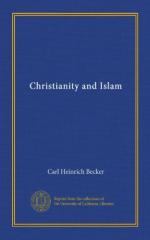Thus we come to the concluding section of this treatise; before we enter upon it, two preliminary questions remain for consideration. If Islam was ready to learn from Christianity in every department of religious life, what was the cause of the sudden superiority of Muhammedanism to the rising force of Christianity a few centuries later? And secondly, in view of the traditional antagonism between the Christian and Muhammedan worlds, how was Christianity able to adopt so large and essential a portion of Muhammedan thought?
The answer in the second case will be clear to any one who has followed our argument with attention. The intellectual and religious outlook was so similar in both religions and the problem requiring solution so far identical that nothing existed to impede the adoption of ideas originally Christian which had been developed in the East. The fact that the West could accept philosophical and theological ideas from Islam and that an actual interchange of thought could proceed in this direction, is the best of proofs for the soundness of our argument that the roots of Muhammedanism are to be sought in Christianity. Islam was able to borrow from Christianity for the reason that Muhammed’s ideas were derived from that source: similarly Christianity was able to turn Arab thought to its own purposes because that thought was founded upon Christian principles. The sources of both religions lie in the East and in Oriental thought.
No less is true of Judaism, a scholastic system which was excellently adapted by its international character, to become a medium of communication between Christianity and Muhammedanism during those centuries. In this connection special mention must be made of the Spanish Jews; to their work, not only as transmitting but also as originating ideas a bare reference must here suffice. But of greater importance was the direct exchange of thought, which proceeded through literary channels, by means of translations, especially by word of mouth among the Christians and Muhammedans who were living together in Southern Italy, Sicily, and Spain, and by commercial intercourse.
The other question concerns the fundamental problem of European medievalism. We see that the problems with which the middle ages in Europe were confronted and also that European ethics and metaphysics were identical with the Muhammedan system: we are moreover assured that the acceptance of Christian ideas by Islam can only have taken place in the East: and the conclusion is obvious that mediaeval Christianity was also primarily rooted in the East. The transmission of this religious philosophy to the non-Oriental peoples of the West at first produced a cessation of progress but opened a new intellectual world when these peoples awoke to life in the thirteenth and fourteenth centuries. But throughout the intermediate period between the seventh and thirteenth centuries the East was gaining political strength and was naturally superior to the




